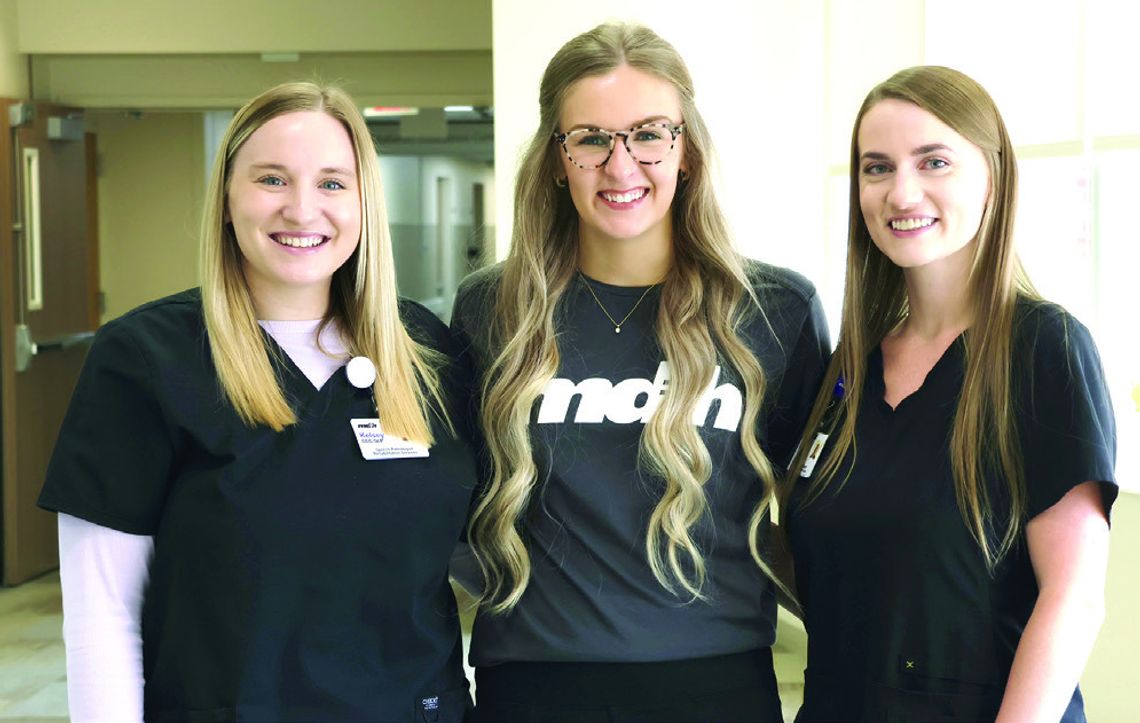MDH Speech Therapy: Communication & More
Talking – and understanding language – seems like a given for most people. But what happens when language is 'lost' or there's a sudden (or not-so-sudden) difficulty in forming words or sentences, or even swallowing due to an illness or injury? That's when the professionals, like the licensed speech therapists at McDonough District Hospital (MDH), come in.
The work of Speech-Language Pathologists Shelbi White, Kelsey Crouse and Katy Miller in MDH's Rehabilitation Unit, which encompasses speech therapy, spans the ages, from toddlers to seniors, providing assistance for a variety of language, cognitive, swallowing and speech disorders.
The trio evaluates and treats patients five days a week as inpatients, outpatients and home health patients. White, Crouse and Miller all hold master's degree from an accredited program. White and Crouse from Western Illinois University and Miller from Illinois State University, and have obtained their professional credentials, Certificate of Clinical Competence in Speech-Language Pathology (CCC-SLP) from the American Speech-Language Hearing Association (ASHA). They have also maintained their license to practice Speech-Language Pathology in the State of Illinois.
They treat patients with a variety of diagnoses/conditions including but not limited to: difficulties swallowing, stroke, traumatic brain injury, neurological disease, Parkinson Disease, Multiple Sclerosis, Cerebral Palsy, Laryngectomy, head and neck cancer, voice disorder, developmental delay, language delay/disorder, stuttering, articulation and phonology delay/disorder and autism/neurodivergency.
For Crouse, a Havana native, her journey at MDH started one year ago after she served as the speech therapist at VIT School District following her 2020 graduation from WIU, while White, who hails from Carthage, began her career at the local hospital right after her 2020 graduation.
'I originally was going to go into physical therapy, and when I came to MDH to shadow someone in physical therapy, she had to leave for a family emergency, so I ended up shadowing a speech therapist and I just fell in love with it,' Crouse said.
White's experience was similar. She always knew she wanted to work with children, and had originally thought about going into education, but her mom, who is a teacher, encouraged her to shadow the speech therapist at her school, White did as her mom suggested and like her colleague, she was hooked.
'I really liked that it was more one-on-one that would allow me to form a greater connection. I did my internship at Blessing and I just fell in love with this, especially since we get to work with all ages,' White said.
Miller has been at MDH since 2021. Before joining the hospital staff, she worked as a paraprofessional in a special services classroom for one year and then worked as a substitute teacher. When she was a senior in high school, she was undecided about her future career, so during the second semester of her final year, she asked to fill her free period as a teacher's assistant. She reached out to the speech-language pathologist at the primary school and she began observing the speech therapy sessions.
'It seemed like a career path I'd be interested in, but it wasn't until my 10-week externship of my second year of grad school, during my final semester, that I really gained an interest in the hospital setting,' she explained.
Now that the three are in a hospital therapy department, what keeps them there and motivated? It's a simple answer: helping others and advocating for others.
'Everyone deserves to have a voice, whether that is verbal communication, use of AAC or even sign language,' White explained. 'We get to help them find their voice, and while doing that, we get to be a voice for them by advocating for their needs.'
Crouse added at their core is genuinely wanting to help those who come through their doors.
'We often see patients in vulnerable moments and always want them to know we genuinely care about them,' she pointed out. 'We get to make that deep connection with them and that's incredibly rewarding.'
Like her colleagues, Miller said that there are aspects of our everyday lives that people don't realize they take for granted, such as something so seemingly easy as being able to speak and communicate your needs and thoughts, or eat your favorite foods safely.
'We are there to help teach, support and guide our patients. We are so grateful that we get the opportunity to play a part in our patient's lives whether it's for a short while or a long while,' Miller said. 'We get to help our patients progress towards their goals. We’re not only building connections with our patients, but also their families as well.
'One area of speech therapy that I really enjoy is being able to support children who use an AAC (augmentative and alternative communication) device to aid their communication abilities. This device helps people who may be nonspeaking or have limited speaking abilities to effectively communicate with others. I love when a child touches the picture of their favorite toy on the device and I bring the toy over so we can play with it and then you see that moment when it clicks for them and they realize that they were understood.'
And while most think of speech therapy as helping someone who might have a lisp or perhaps a stutter, White, Crouse and Miller talked about the vast nature of the field and the therapy they provide, with the typical speech-language disorders most people think about just being the tip of the iceberg. It can range from an acquired loss of language due to a stroke or traumatic brain injury or a developmental cause of language difficulty due to neurological differences such as autism, or an issue with swallowing due to cancer or other illness, along with ailments and disorders that run the gamut.
'Speech therapy encompasses more than some people may realize. I like to say we can work with people of all ages and all abilities. We have the knowledge to treat language, articulation, swallowing, fluency, voice and cognitive impairments,' Miller shared.
When a patient is referred to the Speech Therapy department, one of the first things that will occur is a formal assessment to determine what is going on, the possible cause and the potential treatment(s) to reach a set goal, White said. Using aphasia, which affects a person's ability to communicate effectively, from a stroke as an example, they might show the patient a picture of an apple and ask what the object is. While the person knows the object, they might not be able to think of the word or say the word.
'We utilize a cueing hierarchy. For example, we may provide them with a semantic cue, such as 'it is something to eat,' or a phonemic cue in which we provide them with the first sound ('a') or first couple of sounds ('ap') of the word. If they are then still unable to name the object, we may provide a model of the word and ask them to repeat it back,' White explained.
They also provide exercises for their patients to continue at home to help with progress, they added.
'We strongly believe in early intervention for children. Typically, caregivers or the child’s doctor notice a delay in the child’s speech or language skills. Their doctor makes a referral for a speech-language evaluation and we will do a formal assessment,' Crouse shared. 'During that assessment, we assess the child’s expressive and receptive language skills. Expressive language meaning how they are able to use language and express their needs. Receptive language meaning how they understand language. Based on the results of the assessment, we will discuss the best course of action with the child’s caregiver.'
Between Miller, Crouse and White, they see approximately 50 patients, give or take, each week, including outpatient and inpatient. In addition, White also sees patients at their home as part of home health services. Crouse articulated that as McDonough County is in a rural area of the state, with fewer resources that an urban region, MDH's Speech Therapy is often the resource. And both Crouse and White shared that Western's program, which got them into the field learning early on in their educational careers, provided a comprehensive, well-rounded experience that they've brought to MDH.
'We have a great collaborative relationship not only with WIU, but with the area school districts and other organizations, to ensure we are meeting the needs of our community,' they concluded. 'And for those we see, we want them to know they're not alone and we will work through this together. We are 100 percent on their team and we are behind them. It's about building on their strengths, building their confidence and empowering them. We're right here alongside you all the way.'









